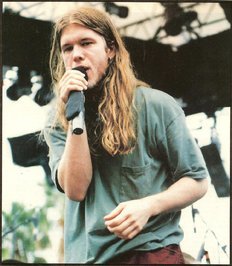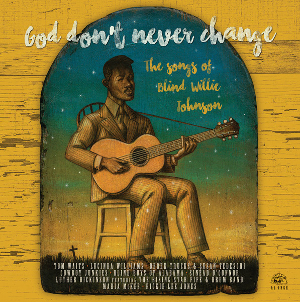
Richard Shannon Hoon was an American singer-songwriter and musician. He was the lead singer of the band Blind Melon from 1990 until his death in 1995.

Blind Willie Johnson was an American gospel blues singer and guitarist. His landmark recordings completed between 1927 and 1930—thirty songs in total—display a combination of powerful "chest voice" singing, slide guitar skills, and originality that has influenced generations of musicians. Even though Johnson's records sold well, as a street performer and preacher, he had little wealth in his lifetime. His life was poorly documented, but over time, music historians such as Samuel Charters have uncovered more about Johnson and his five recording sessions.
Galactic is an American funk band from New Orleans, Louisiana.
The Radiators, also known as The New Orleans Radiators, are an American swamp rock band from New Orleans, Louisiana, United States. The band's musical style, which draws from blues, rock, rhythm and blues, funk and soul music, has attracted a dedicated fanbase who the band calls "fish heads". Described by OffBeat magazine as "New Orleans' longest-running and most successful rock band", The Radiators had only limited commercial success, with only a handful of chart appearances, but, as a party band from a party town, their enthusiastic live performances, danceable beats and relentless touring earned the band a dedicated following and the admiration of many of their peers.

"It's Nobody's Fault but Mine" or "Nobody's Fault but Mine" is a song first recorded by gospel blues artist Blind Willie Johnson in 1927. It is a solo performance with Johnson singing and playing slide guitar. The song has been interpreted and recorded by numerous musicians in a variety of styles, including Led Zeppelin on their 1976 album Presence.

Mark Howard is a Canadian record producer, engineer, and mixer, who has worked with artists including Bob Dylan, Tom Waits, The Tragically Hip, Lucinda Williams, Willie Nelson, Marianne Faithfull, Emmylou Harris, U2, Peter Gabriel, R.E.M., Neil Young, Kaizers Orchestra and The Neville Brothers.

Junker Blues is a piano blues song first recorded in 1940 by Champion Jack Dupree. It formed the basis of several later songs including the 1949 "The Fat Man" by Fats Domino and the 1952 "Lawdy Miss Clawdy" by Lloyd Price. The song is about a drug user's conflict with life and the law, makes references to cocaine, "needles", "reefers", and life in the penitentiary, and contains admonishments against the use of hard drugs.

"Amen" is a song by American rapper Meek Mill from his debut studio album, Dreams and Nightmares (2012). Featuring Canadian rapper Drake, the song includes background vocals from Jeremih. It was produced by Key Wane and Jahlil Beats, with the first serving as a songwriter alongside the vocalists. Due to the interpolation of the Doobie Brothers' "Minute by Minute", written by Lester Abrams and Michael McDonald, they also received songwriting credits. The song was thought of by Key Wane in New York's Times Square, after he prayed when experiencing failure. On June 19, 2012, it was released for digital download and streaming as the album's lead single by Maybach Music Group and Warner Bros. Records. At the time of release, Philadelphia reverend Jomo K. Johnson encouraged boycotting the song over alleged usage of the church for sinful activities, leading to the two debating publicly on Hot 107.9. Mill eventually apologized for any offense and Johnson called off the boycott, forgiving him. A hip hop number with pop and R&B elements, the song relies on a gospel beat, with lyrics focused on sexual exploitation and wealth.
"Keep Your Lamp(s) Trimmed and Burning" is a traditional gospel blues song. It alludes to the Parable of the Wise and Foolish Virgins, found in the Gospel of Matthew at 25:1-13, and also to a verse in the Gospel of Luke, at 12:35.

"Bye and Bye We're (or, I'm) Going to See the King" is a Christian song from the African-American musical tradition. It is known by a variety of titles, including "I Wouldn't Mind Dying (If Dying Was All)" and "A Mother's Last Word to Her Daughter". It was recorded seven times before 1930, using the preceding titles.

"Let Your Light Shine on Me" is a traditional gospel blues song, having been recorded by The Wiseman Quartet in 1923, by Ernest Phipps in 1928, and by Blind Willie Johnson in 1929. The song itself is also known as "Shine On Me", "Let It Shine on Me", "Light from the Lighthouse" and "Light from Your Lighthouse".

"God Moves on the Water" is a gospel blues song recorded by Blind Willie Johnson in 1929 and released on a 78 rpm record by Columbia Records.
"Trouble Will Soon Be Over" is a traditional gospel blues song recorded in 1929 by Blind Willie Johnson and Willis B. Harris, who is thought to have been his first wife.

"Leave It There" is a Christian hymn composed in 1916 by African-American Methodist minister Charles A. Tindley. It has become popular enough to have been included in 12 hymnals; and even to be attributed to "traditional" or "anonymous". The title is sometimes given as "Take Your Burden to the Lord and Leave It There" or as "Take Your Burden to the Lord" or as "Take Your Burden", words taken from the song's refrain; the plurals "burdens" and "them" are sometimes used, and "God" instead of "the Lord":
"Denomination Blues" is a gospel blues song composed by Washington Phillips (1880–1954), and recorded by him in 1927.

God Don't Never Change: The Songs of Blind Willie Johnson earned Grammy Award nominations for Best Roots Gospel Album and Best American Roots Performance for Blind Boys of Alabama recording of Mother's Children Have a Hard Time. The compilation was produced by Jeffrey Gaskill of Burning Rose Productions. The package features extensive historical liner notes by author Michael Corcoran.

The Complete Blind Willie Johnson is a compilation album of all the known recordings by American gospel blues singer-guitarist Blind Willie Johnson. As part of the Roots N' Blues series, it was released jointly by Columbia Records and Legacy Recordings, on April 27, 1993. All of the tracks on the two-compact disc set were originally issued by Columbia on the then-standard two-sided 78 rpm record format.

American Epic: The Best of Blind Willie Johnson is a compilation album released to accompany the award-winning American Epic documentary film series. It collects performances from Blind Willie Johnson's five recording sessions for Columbia Records in Dallas, Atlanta, and New Orleans between 1927 and 1930. The album was released as a 16-track download and a vinyl LP.

The discography of Lucinda Williams, an American singer, songwriter, and musician, consists of 15 studio albums, one live album, two video albums, and 25 singles, on Folkways Records, Smithsonian Folkways, Rough Trade Records, Chameleon, Mercury Records, Lost Highway Records, New West Records, Highway 20 Records, and Thirty Tigers.














